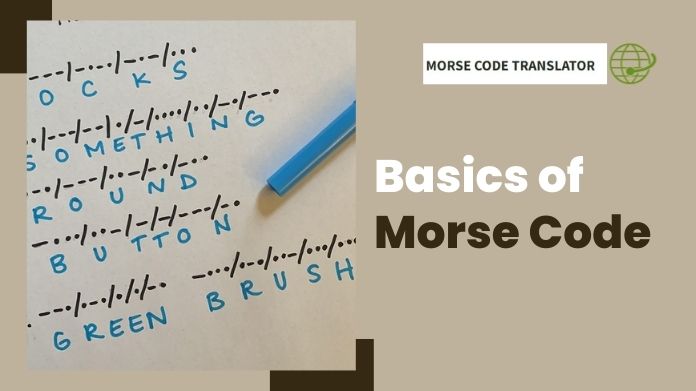Morse Code, a communication system that employs a series of dots and dashes, is a fascinating and historically significant language.
Developed in the early 1830s, it played a vital role in the history of communication technology.
This article will guide you through the basics of Morse Code, its history, the alphabet, and tips for learning this unique form of communication.
The History of Morse Code

Morse Code is named after Samuel Morse, one of its co-inventors. Born in 1791, Morse was an American inventor, painter, and professor.
He created a telegraph system, ultimately developing the Morse Code. The telegraph was an innovation that enabled rapid long-distance communication, and Morse Code became its language.
Working alongside his assistant Alfred Vail, Morse created a system of encoding letters and numbers into sequences of dots and dashes.
The duration of a dot is the basic unit of time in Morse Code, with a dash typically lasting three times as long. The spaces between symbols and characters are integral to interpreting the code.
The Morse Code Alphabet
The Morse Code alphabet consists of representations for letters, numbers, and various symbols.
Here’s a reference for some commonly used Morse Code symbols:
A .- B -… C -.-. D -..
E . F ..-. G –. H ….
I .. J .— K -.- L .-..
M — N -. O — P .–.
Q –.- R .-. S … T –
U ..- V …- W .– X -..-
Y -.– Z –.. 0 —– 1 .—-
2 ..— 3 …– 4 ….- 5 …..
6 -…. 7 –… 8 —.. 9 —-.
Each letter and number is uniquely represented by a combination of dots and dashes, allowing efficient message transmission.
Learning the Morse Code alphabet is the foundation for mastering this unique language.
Learning the Basics of Morse Code
Learning the basics of Morse Code can be a rewarding endeavor. Whether you’re interested in the history of communication amateur radio or enjoy the challenge of mastering a new skill.
Here are some tips to get started:
1. Resources: Begin by gathering resources for learning Morse Code. Numerous apps, websites, and books are available for beginners. Choose the ones that best suit your learning style.
2. Start with the Basics: Begin with the fundamental Morse Code alphabet. Familiarize yourself with each letter’s corresponding pattern of dots and dashes.
3. Practice Listening: Train your ears by listening to Morse Code recordings or using online resources. Focus on recognizing individual letters and common words.
4. Hands-On Practice: To become proficient, practice sending and receiving Morse Code messages. You can use a Morse Code key or paddle, available for purchase online or practice with a Morse Code website or app.
5. Set Goals: Establish achievable goals for your Morse Code learning journey. Monitor your progress and work on improving your speed and accuracy.
6. Join Communities: Connect with amateur radio enthusiasts and Morse Code aficionados. Engaging with a community can provide valuable support and opportunities for practice.
7. Be Patient: Learning Morse Code takes time and patience. Take your time with initial difficulties. Consistent practice and dedication will lead to proficiency.
The Practical Uses of Morse Code
While Morse Code may seem like a relic of the past, it has various practical applications today.
Here are a few notable examples of the basics of Morse Code:
1. Amateur Radio: Many amateur radio operators still communicate with Morse Code. It’s considered a valuable skill within the amateur radio community.
2. Emergency Communication: When traditional communication methods may fail in emergencies or disasters, Morse Code can be a reliable means of transmitting distress signals.
3. Historical Reenactments: Morse Code is often featured in historical reenactments, offering participants and spectators a window into the past.
4. Cognitive Benefits: Learning Morse Code can enhance cognitive skills, including memory and concentration. It’s an excellent mental exercise.
Conclusion
Learning the basics of Morse Code is an intriguing and rewarding journey. This unique form of communication connects you to the history of communication technology, offers practical applications, and hones cognitive skills.
With dedication and practice, anyone can acquire this timeless skill, keeping the tradition and historical significance of Morse Code alive.
Whether you’re interested in emergency preparedness or history or enjoy learning new languages, Morse Code is a valuable and engaging pursuit.
